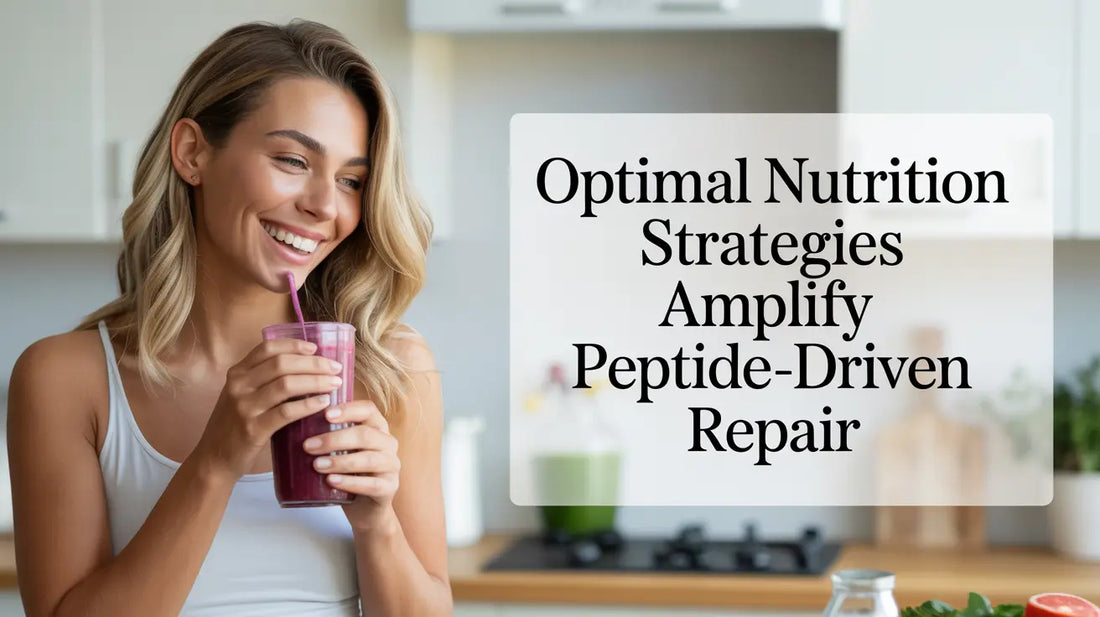
Optimal Nutrition Strategies Amplify Peptide-Driven Repair – Here’s Why
Share
Optimized nutrition enhances peptide therapy outcomes for muscle recovery by supplying essential proteins, vitamins, hydration, and strategic timing to fuel tissue regeneration and boost collagen synthesis.
In this Article:
What You’ll Read:
- Critical macronutrient ratios that support anabolic and repair processes.
- Micronutrient roles in collagen cross-linking, antioxidant defense, and immune support.
- Hydration and electrolyte guidelines for optimal cellular function.
- Meal timing and planning to synchronize with oral strip dosing.
- Supplement and lifestyle recommendations to complement your Restore Peptide Blend protocol.
What You’ll Learn:
- How to balance protein, fats, and carbohydrates to maximize peptide-driven recovery.
- Which vitamins and minerals directly influence extracellular matrix remodeling.
- Strategies for maintaining fluid and mineral balance to support nutrient delivery.
- Practical meal and snack timing around workouts for sustained repair.
- Key supplements and recipes that integrate seamlessly with peptide therapy.
Key Nutrients for Peptide Therapy Success
Providing the right building blocks ensures peptides can effectively stimulate muscle recovery and tissue repair.

Protein for Tissue Repair
Adequate protein intake supplies amino acids crucial for muscle regeneration and collagen formation.
- Leucine-Rich Sources: Dairy, eggs, and soy trigger muscle protein synthesis pathways.
- Collagen Peptides & Bone Broth: Deliver glycine and proline to strengthen connective tissues.
Healthy Fats for Cellular Health
Unsaturated fats support membrane integrity and hormone production relevant to healing.
- Omega-3 Fatty Acids: EPA and DHA reduce inflammation and improve cell signaling.
- Monounsaturated Fats: Olive oil and avocados provide energy and aid nutrient absorption.
Micronutrients That Drive Recovery
Vitamins and minerals act as cofactors in enzymatic processes central to repair.
Vitamin C for Collagen Synthesis
Vitamin C is essential for hydroxylation of pro-collagen, enhancing fiber strength and stability.
Zinc & Magnesium for Cellular Repair
Zinc supports DNA synthesis and immune function, while magnesium regulates protein assembly and muscle relaxation.
Antioxidants for Oxidative Balance
Polyphenols and carotenoids from fruits and vegetables neutralize free radicals that can hinder peptide activity.
Hydration & Electrolyte Optimization
Maintaining fluid and mineral balance is essential for muscle recovery, peptide absorption, and nutrient transport.
Water Intake Guidelines
Adequate hydration ensures efficient circulation and sublingual uptake of oral strips.
Key Electrolytes
Sodium, potassium, and magnesium work together to regulate muscle contractions, nerve signaling, and cellular hydration.
Meal Timing & Planning
Synchronizing meals with peptide administration supports consistent blood levels and muscle recovery windows.
Pre- and Post-Workout Nutrition
Combining fast-digesting carbohydrates with protein shortly before and after exercise amplifies recovery signals.
Steady Amino Acid Supply
Spacing protein-rich meals every 3–4 hours maintains a constant flow of amino acids to regenerating tissues.
Supplements to Complement Peptide Therapy
Targeted supplementation fills dietary gaps and works in concert with peptides for enhanced muscle recovery and repair.
Collagen Supplements
Hydrolyzed collagen supports the extracellular matrix alongside peptide-driven synthesis.
Joint Support Formulas
Elements like glucosamine and chondroitin can aid connective tissue health when stacked with peptides.
Adaptogens & Herbal Allies
Rhodiola, ashwagandha, and turmeric help modulate stress and inflammation, supporting holistic recovery.
Integrating Nutrition with Peptide Protocols
Alignment between diet and your peptide regimen boosts overall effectiveness.
- Pair high-protein meals with your morning and evening Restore Peptide Blend strips to maximize uptake.
- Avoid heavy meals immediately before strip use; wait 5–10 minutes after dosing to eat or drink.
- Consider nutrient timing when planning on/off cycles for receptor sensitivity resets.
Learn: Peptide Therapy for Muscle Recovery
Frequently Asked Questions
Quick answers to common nutrition and peptide therapy inquiries.
How much protein should I consume daily?
Aim for 1.6–2.2 g per kilogram of body weight to support muscle repair and peptide-driven synthesis.
Can I use supplements with oral strips?
Yes, supplements like vitamin C and omega-3s complement peptide actions—just wait 5–10 minutes after strip use before taking additional nutrients.
What foods should I limit during peptide therapy?
Minimize ultra-processed foods, added sugars, and trans fats to prevent inflammation that can counteract peptide benefits.
How do I plan meals around dosing?
Take strips on an empty or lightly fed stomach; schedule meals 5–10 minutes after administration to avoid absorption interference.
